What Being a Young Muslim Woman Is Really Like
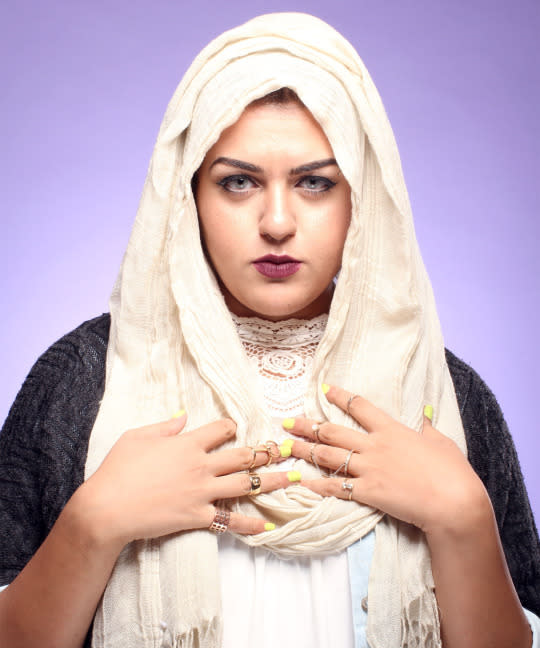
Photography by Sam Cannon
By Erin Cunningham
Over the past few years, modesty and style have seemingly converged. Longer sleeves, looser silhouettes, and an overall more understated aesthetic have infiltrated the runways, providing women with the notion that a fashion-forward lifestyle can mean being as dressed down, or covered up, as one would like.
For young observant women though, be they practicing Muslims or Orthodox Jews, modesty is so much more than getting dressed in the morning: it’s a lifestyle. It’s about looking in the mirror and being satisfied with what’s looking back at you; practicing proper etiquette and kindness to those around you, and respecting the religious beliefs and faith to which you adhere.
In 2009, then-high school senior Amani Al-Khatahtbeh decided that young (and stylish) Muslim women needed an outlet where they could talk about their clothing and looks — as well as other topics that affect their everyday life, from politics to beauty to pop culture. Living in the tri-state area in a post-9/11 world, where stereotypes plagued the people of her culture and others, she was sick of the feelings that girls like her experienced on a daily basis: alienation, embarrassment, even shame. She wanted the world to know that she and her friends were just like every other teenager. And she wanted their voices to be heard.
Enter: MuslimGirl.net, Al-Khatanhtbeh’s brainchild that is now dominating the internet, providing a perspective that’s rarely seen in the media. It’s about empowerment, about feminism, about standing up for yourself (and each other). It’s about presenting the world with a new portrayal of what young Muslim women are really like — that they’re not oppressed or shunned, but intellectual and inspired, and more than ready for society’s respect and acceptance. It has a lot to say, and we’re here to listen.
Ahead, we talked to Al-Khatanhtbeh and nine of her friends (and fellow MuslimGirl staffers) about their personal style, their religious beliefs, and how they’re breaking down boundaries, one blog post at a time.
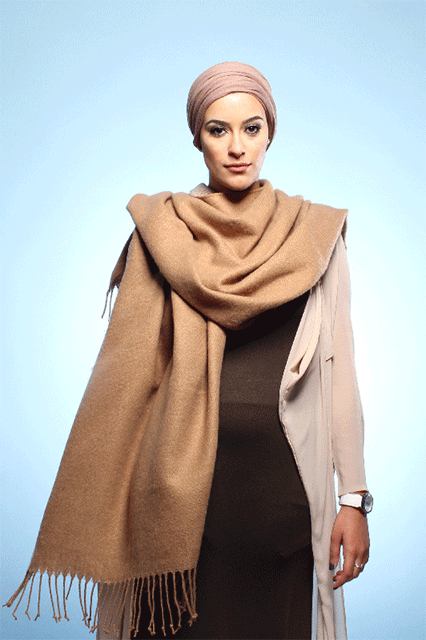
Sara Maher, 23, Lookbook Editor
Tell us about the role religion played in your upbringing.
“My family has always been incredibly patient with and understanding of me, and they have always given me the chance to explore my religion on my own. They have never forced anything on me but a desire to learn more about my own beliefs.
“I started wearing the hijab when I was in third grade, because it was something that I wanted to do. The following year, in 2001, [my parents] begged me to remove it, because they were honestly worried about my wellbeing in this country. I refused. I refused because the hijab had become a part of who I was, and I respected everything that it stands for. I still do, and I work every day to show the world how beautiful the hijab really is.”
Related: What Losing 110 Pounds REALLY Looks Like
What would you say is society’s greatest misconception of young Muslim women?
“There are so many, but the biggest one is that we are submissive. To believe that we are submissive to the point where we have no say to our husbands marrying over us multiple times is so ridiculous that I can’t help but laugh when I hear it. There are so many misconceptions, and all they really need is a little bit of unbiased research to be dismissed. I dare someone to quiet me down — my opinions, my beliefs, and even my fashion.”
How has your religion influenced your personal style — and vice versa?
“As a Muslim woman who wears the hijab, I have dedicated myself to incorporating a significant level of modesty in my wardrobe. People may think that it isn’t easy to balance modesty and fashion, but that is not as true as it seems. Sure, when summer comes around and there is little in stores with a decent amount of coverage, you can get bummed out that your shopping is so limited. However, it’s all about being creative.”
Define modesty, in your own terms.
“Modesty is balance. Modesty is knowing your personal limits. I say personal, because that is exactly what modesty is. My modesty may not translate to yours, and that is completely okay. People are conditioned to paint with a single paintbrush, and so when they think of modesty, they think of it in its most extreme cases; they may think of nuns, niqabis [Muslim women who wear veils that leave only their eyes exposed], or the pope. However, true modesty is really as simple as creating personal balance.”
Who is your style icon?
“I am extremely inspired by the elegant, funky, and radical Dina Tokio — a hijabi woman who pushes the boundaries of what can be done with clothing, and even the hijab.”
How would you describe the mission of MuslimGirl? Why do you think a site like this is important for young women?
“MuslimGirl’s mission statement has everything to do with empowering Muslim women in the context of a society that has limited them to a biased, incorrect, and uniform image. We want to break that understanding with our collective identities, to reassure Muslim women that it is fine to be who you are, and to remind Muslim women that we have their backs no matter what. It’s incredibly important for young women, too, because it speaks to the liberation of women as a whole. It’s a site made by women, promoted by the voices of women, and driven by the desire of women to encourage, love, and fight for other women.”
How do you see your generation of observant Muslim women changing?
“Working for MuslimGirl, and working with my fellow writers and editors, I can’t help but describe this generation of Muslim women as confident, fierce warriors. I can remember a time when Muslim women in this country were quiet and careful. It was important to be, because there wasn’t much support to fight against ignorance — especially after 9/11, when Islamophobia spiked to a disgracefully high level. Though Islamophobia is still very much real, I’ve never felt more love and support than I do now; this 9/11, I received more messages of encouragement than I ever had. I remember literally crying at the beauty of society’s growth in response to ignorance against Muslim women. Who can forget #IllRideWithYou, which fought against violence and fear and spread all over social media like a blazing fire of righteousness? Muslim women are finally breaking free from the oppression of Islamophobia in Western countries.”
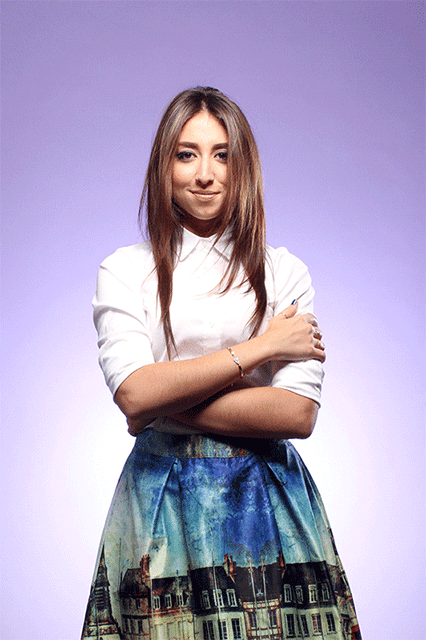
Jenan Matari, 24, Online Editor
Tell us about the role religion played in your upbringing.
“Religion was always a part of my life growing up. I went to Sunday Islamic school for 12 years. I loved learning about the history of my religion and culture. We’d fast during Ramadan, go to the mosque for prayer, and celebrate Eid with our family.
"Part of me always felt a bit detached, though. I went through a period of about three years where I lost my faith and felt a little out of place in the world. Although there was a balance between two cultures (Middle Eastern and American), I always felt a little off in both types of settings; I was ‘too Arab’ or Muslim for some of my American friends, and I was ‘too Americanized’ for some of my Arab/Muslim ones. Traveling actually really helped me find my faith again. Experiencing different cultures and religions around the world — and seeing how much influence my own religion had in areas across the globe — really made me see Islam in a new light. I became proud of being a Muslim, and learned to appreciate our traditions more rather than just going through the motions. Now, I’d say I’m more spiritual than religious.”
Related: This 30-Day Upper-Body Challenge Will Transform Your Arms & Shoulders
What would you say is society’s greatest misconception of young Muslim women?
“That we’re only good for cooking, cleaning, having babies, and pleasing a man. Also, that we’re oppressed. Non-Muslims have this idea in their minds that Muslim women are pressured or forced into doing things they don’t want to do — like getting married or covering our hair. Although that does happen at times, that’s not what life is like for all of us. My parents emphasized the importance of getting an education and being confident in yourself before settling down and being ready for 'that’ time of your life. There are also a number of women in my family who are covered, and a number of us who are not. And all of us chose our paths.”
How has your religion influenced your personal style — and vice versa?
“In the American sense, I dress pretty modestly and conservatively —but sometimes what I wear is seen as provocative in the Muslim realm. My religion has definitely influenced my style. I grew up never being allowed to wear short-shorts or miniskirts; bikinis were not allowed during my teenage years, and I still don’t wear things that are too revealing. In the back of my mind, I always have this thought while getting dressed: What would Baba [my dad] say about this outfit?”
Define modesty, in your own terms.
“I think people are under the impression that modesty cannot be fashion-forward. A woman can dress modestly and still be beautiful, trendy, and expressive. Just because you choose to live a modest life doesn’t mean you have to dress in clothes that are four sizes too big for you. I think the misconception goes hand-in-hand with the stereotypes around religion. Any religion. When you think of a modestly dress woman in Christianity, we most likely immediately think of nuns; much like the modesty connection in Islam with women who wear the hijab or even more conservative — the niqab.”
Related: The Secret To The Perfect Plank
Who is your style icon?
“Definitely Audrey Hepburn: in all aspects of the term 'icon.’ Her style embodies elegance and class. She will always be a timeless beauty. Although she’s mainly remembered for her beauty, she was actually quite an amazing woman. She was a major contributor (monetarily and in volunteering her time) to UNICEF and was focused on helping struggling children around the world. Her entire existence makes her the perfect role model to me.”
How would you describe the mission of MuslimGirl.net? Why do you think a site like this is important for young women?
“Not only is MuslimGirl breaking stereotypes surrounding Islam, but we’re crushing misconceptions about women in general, too. Our site is run entirely by young women who aspire to make their mark on this world and make it a better place. In a world that, unfortunately right now, passes so many judgments about a religion of 1.6 billion people — most of those judgments being geared towards how they think women are treated in Islam — it is so important for a site like MuslimGirl to be a voice for that category, to debunk the fallacies and correct the misunderstandings about who we are as women and as Muslims. To me, one of the most important things is to show both Muslims and non-Muslims that there is no specific face of a woman in Islam. We come in all colors, shapes, sizes, from all cultures of countries all over the globe. And while we may speak differently, practice differently, and dress differently, we’re all proud Muslim women.”
How do you see your generation of observant Muslim women changing?
“We’re becoming stronger, for sure, and definitely more vocal. We have so much to say and so much good to offer this world, and we’re finally reaching the point of making sure our voices are heard. It’s no longer taboo for a Muslim woman to go away to college, to live on her own, to have her own career, or travel the world by herself. And we’re not only breaking stereotypes within Western society; Muslim women are breaking stereotypes within our own communities, as well.”
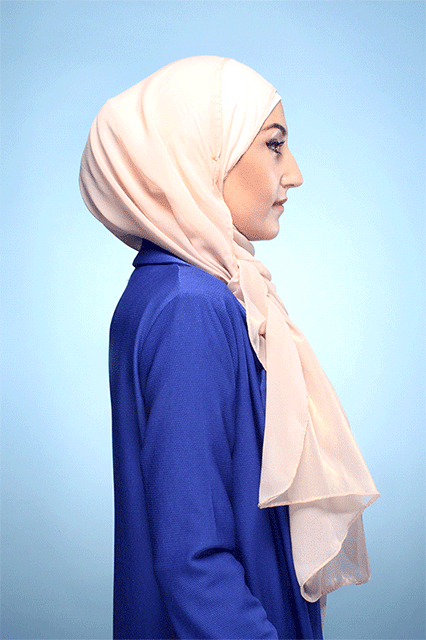
Nihal Al Qawasmi, 20, Managing Editor
Tell us about the role religion played in your upbringing.
“My parents always kept me hyper-aware of my identity, and that’s something I’m forever grateful for. They made it a priority for me to practice my religion and be conscious of my Palestinian roots at the same time. I was enrolled in a local Islamic school in sixth grade, and I ended up graduating from there, too. As a result, it encouraged me to put on my hijab at a young age. Eight years later, no longer in the sheltered hallways of an Islamic school, I’m still going strong.”
What would you say is society’s greatest misconception of young Muslim women?
“Society thinks young Muslim women are oppressed, submissive, and voiceless. And it’s pretty hilarious, too. That’s why MuslimGirl is so important to so many of us. It’s a platform that allows us to prove everyone wrong and show what it actually means to be a Muslim woman.”
How has your religion influenced your personal style — and vice versa?
“Being a hijabi — or a headscarf-wearing Muslim woman — has definitely influenced the way I dress, and my overall style. I’ve been a self-proclaimed 'fashionista’ since my early teen years, so learning to balance the two has been easy. I incorporate the latest trends into my wardrobe, while also adding a little modest twist. I love experimenting. And, I must say, hijabi-istas, if you may, are very creative and stylish.”
Related: 4 Crazy Makeup Hacks You Need To Learn Now
Define modesty, in your own terms.
“To me, modesty is more than just wrapping a scarf on my head. Modesty comes from the inside. So, yes, you can be modest without wearing a hijab. It’s not limited to a piece of cloth. And I think that’s where the misconceptions come from. People think you need to be dressed in grim colors and oversized pieces, or that modesty is old-fashioned or limiting, when it really isn’t. Modesty is however you want to interpret and practice it in your lifestyle.”
Who is your style icon?
“Does Blair Waldorf count? Just kidding — maybe! My fashion dream team would be Olivia Palermo and Dina Tokio. Both are amazing when it comes to mixing pieces and styles, and veering outside the norm.”
How would you describe the mission of MuslimGirl? Why do you think a site like this is important for young women?
“We’re not here to 'give a voice to the voiceless.’ We’re here to elevate the voices that are already out there, and to justly represent Muslim women in the media by reclaiming our narrative and breaking every single misconception out there. Along with reshaping the image of Muslim women and reclaiming our space in society, MuslimGirl is all about empowering one another. And for young girls everywhere, that’s a very important thing to have.
"Generally speaking, women are constantly misrepresented in media; but the narrative of Muslim women especially seems to get lost in translation. I think it’s important to focus on the stories that mainstream media avoids or gets completely wrong. It’s also important to aim to challenge the fear-mongering that goes on at almost every mainstream outlet.”
How do you see your generation of observant Muslim women changing?
“I think this generation of Muslim women is owning it. Not to say that the generations before us were passive in any way — it’s actually because of them and their hard work that we are where we are today. We’re standing on the shoulders of giants. We’re aware of who we are and what we believe in, and we’re letting that push us even harder, not break us. Although the Western society we live in tries so hard to make us invisible sometimes, we’re just not going to have it.”
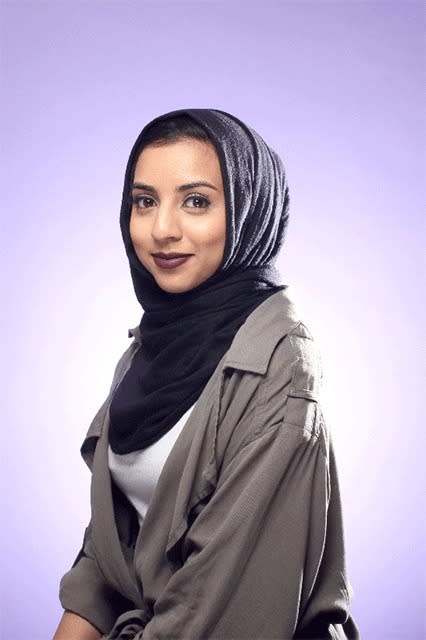
Sobi Masood, 20, Fashion Writer
Tell us about the role religion played in your upbringing.
“I grew up in a fairly practicing Muslim household, which made a large impact on the person I am today and how I have chosen to practice my faith currently. I think it’s safe to say that my parents instilled much more than ritualistic and cultural aspects of Islam —they made it a point to teach me key Islamic morals and principles that are applicable to almost all life situations. With various experiences, I have taken a further interest in the teachings of Islam and how they best apply to my life, which in turn helps me in the constant strive to become a better person.”
What would you say is society’s greatest misconception of young Muslim women?
“I think society doesn’t understand that Muslim women do in fact have an intellect and volition (two things that I have been taught to hone my entire life) and they are not just subservient human beings that are forced into arranged marriages. Rather, we are movers, shakers, and producers, bringing passion and beauty to the world around us.”
How has your religion influenced your personal style — and vice versa?
“What I have learned in the three years that I have worn a hijab — while simultaneously blogging about modest fashion — is that dressing modestly and being fashion-forward are certainly not mutually-exclusive…but they can go hand-in-hand. For most people, it’s simply about inspiration and figuring out a way to apply a certain trend to your style. Most models you see in advertisements and on runways are not necessarily dressed like typical Muslim or Orthodox Jewish women. However, you can certainly see a modestly dressed woman rocking a hijab, culottes, and platform shoes with sunglasses, a septum piercing, and a bold orange lip. (Goals, I know.) Sure, it takes some improvising, but it truly comes down to wearing what feels right and comfortable. Dressing modestly and wearing the hijab is extremely empowering; it allows me to really challenge myself in striving to be better.”
Describe modesty, in your own terms.
“Modesty, to me, is more than just physically covering myself. It’s about the modest behavior I strive to instill within myself. By behavior, I mean things like respectful interactions with Muslims and non-Muslims, etiquette in various situations, the way I speak or carry myself, and more.
"As for the the physical dressing, dressing 'modestly’ is left open to interpretation. A predominant misconception is that women are forced to wear long black dresses and face veils, though Islam’s Holy Book of the Quran does not explicitly tell a woman what type of scarf or dress to wear or how she should wear it; it is simply prescribed to dress modestly while encompassing modest virtues. Many non-Muslims who oppose the hijab forget that the Virgin Mary is always depicted veiled and in modest dress. I certainly do not believe that wearing the hijab…means one is more pious and virtuous than one who does not wear it… Every Muslim woman has the right to interpret modesty the way she wishes and deems appropriate for herself. It’s as simple as that.”
Who is your style icon?
“The Olsen twins. They are just fabulous. From their red carpet looks to their street style, they are always on point. They always seem to incorporate just the right amount of boldness in their looks and they own it.”
How would you describe the mission of MuslimGirl? Why do you think a site like this is important for young women?
“MuslimGirl is an empowering platform and a creative outlet in which young Muslim women are able to voice their opinions on matters relevant to us, whether they’re religious, political, pop-culture-related, or more. Oftentimes, matters related to Muslim women are discussed without actually including a voice of a Muslim women. It is time for us to not only be included in the conversation, but for us to be put on the forefront to discuss a wide spectrum of related issues at hand.
Related: Meet The New It Models You Need To Know
"Being a part of the team that covers all things fashion, I find our section to beimperative to the fashion sphere. As a blogger, many girls find that dressing fashionably while still trying to apply aspects of the faith is difficult. However, with various lookbooks and trend-related posts, we hope to inspire and show girls that this is very much possible and within [their] budgets. We want them to be able to walk into a popular fashion retailer like Zara and H&M and realize that, with a bit of hunting and a little bit of improvising, you can walk out with an on-trend outfit that [you] look great and feel comfortable in. With these posts, we’re slowly breaking the stereotypes of Muslim women — one outfit at a time.”
How do you see your generation of observant Muslim women changing?
“I see somewhat of a revolution going on amongst my fellow Muslim ladies. Whether it’s an internal revolution or an external one, it’s amazing to see so many platforms being used as creative outlets for these revolutions. I see the power of change when we all come together for a greater cause; I see that we feed off of each other’s positive energy and push each other to enlighten our corners of the world. I think we’re breaking the molds of the 'stereotypical observant Muslim woman’ and I can confidently say that I have never seen something this empowering and beautiful.”
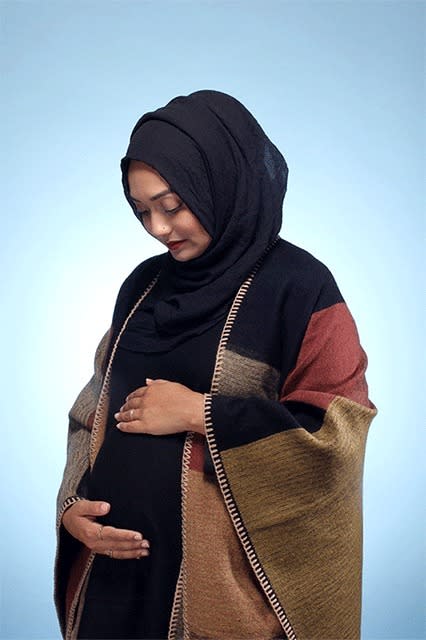
Sania Siddiqui, 25, Fashion Writer
Tell us about the role religion played in your upbringing.
“I grew up in a practicing Muslim household. Initially, my family practiced more of their cultural faith (what was passed down to them). As we got older, we learned more about religion and began to practice our faith in all aspects of our lives. We grew together as a family. My parents always encouraged me to speak my mind and explore my faith. I decided to wear the headscarf in middle school, even before my mother decided to wear it a few years later. They supported me in all of my decisions while encouraging me to do the best at whatever I did. It was important to them that I practice my faith in my daily life and to succeed in my education and career.”
What would you say is society’s greatest misconception of young Muslim women?
“The greatest misconception is that we are second-class to young Muslim men. Many people assume that Muslim women just do what they are told by their fathers, brothers, and husbands. What most people don’t quite understand is that the way we dress, act, or choose to live our lives is not by what another individual tells us, but rather our faith. My father and husband have only supported my decisions in regards to education, career, and the way I choose to dress.”
How has your religion influenced your personal style — and vice versa?
“Religion has a huge impact on my personal style. However, since I’ve chosen to wear the headscarf since I was 12, my faith and fashion have evolved over the past 13 years tremendously! I love following the latest trends and actually enjoy the challenge of attempting to modify them to fit my idea of modesty. For myself, though, faith comes before fashion. I will forego some fashion trends if I feel like it doesn’t complement my faith — but that’s just my interpretation of modest fashion.”
Describe modesty, in your own terms.
“Everyone defines modesty in their own way. Some people use their faith to identify modesty, and some use society’s meaning of modesty. For myself, it’s a combination of both. It really depends on the type of environment you are brought up in, and what you choose to take or reject. Modesty, to me, is not just about how I dress, but how I carry myself as a young Muslim woman. It encompasses my mannerisms with my family, my interactions with strangers, and my etiquette with my friends. It includes who I am as an individual, not just how I appear.”
Related: The 12 Types of Orgasms — What They Are & How To Have Them
Who is your style icon?
“Olivia Palermo. Her style is classy yet timeless. I can always find inspiration in her style!”
How would you describe the mission of MuslimGirl? Why do you think a site like this is important for young women?
“For too long, Muslim women have only been talked about. It’s our time to take back the mic and lead the conversation! This site empowers young women to speak for themselves and be proud of their Muslim identity.
"As a part of the fashion team, I want to encourage young Muslim women to embrace their identity through how they dress. While growing up, modesty was always seen as something to be ashamed of. I want to encourage Muslim women to celebrate modesty. Modesty and fashion are not at all mutually exclusive. In fact, they are one in the same. They are an expression of who we are as individuals. I love wearing the latest fashion trends and styling them while also maintaining the key elements of modesty.”
How do you see your generation of observant Muslim women changing?
“Our generation of observant Muslim women is definitely changing the game. Before, a Muslim woman was expected to fit one mold. It was very black-and-white. Our generation is making it clear that Muslim women come on a broad spectrum. We are empowering one another with positive energy, regardless of how we choose to practice our faith. We support each others’ endeavors, and that is truly what will help us a grow and succeed as a group.”

